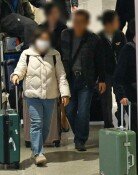Foreign Exchange Transactions will be Fully Liberalized before 2010
Foreign Exchange Transactions will be Fully Liberalized before 2010
Posted June. 04, 2005 06:44,
An all-out liberalization for foreign exchange transactions scheduled to begin in 2011 will be enforced more than a year earlier than expected.
In accordance with this plan, it is likely that individuals and corporations will be able to acquire overseas real estate freely, as well as that financial companies will be able to borrow foreign capital freely, earlier than previously anticipated.
Measures to promote overseas investment, including a measure to increase the limit of the amount of overseas real estate an individual is allowed to purchase, will be announced and will go into effect next week.
The National Economic Advisory Council (NEAC) held a first financial hub meeting presided over by President Roh Moo-hyun in Cheong Wa Dae on the morning of June 3 to conclude its plan to develop South Korea into an international finance center.
In the beginning, the government planned to finalize a three-step measure regarding the liberalization of foreign exchange transactions from 2009 to 2011, but it decided to abolish all regulations for foreign exchange transactions by introducing this plan more than a year earlier and leaving the least reporting system.
Accordingly, it is forecasted that regulations, including those on investment in overseas real estate, borrowing of foreign capital by local and financial companies, and borrowing of local currency (won) by foreigners, will be abolished earlier.
The government decided to loosen regulations for foreign exchange transactions related to companies by revising related provisions. In response, when companies at home and abroad loan a short-term operational fund to their overseas branches in the second half of this year and if they lend equal or less than $10 million per day (based on the balance), they wont need permission from the Bank of Korea or be required to report to it.
In order to induce international credit rating agencies, including Moodys Investors Service and Fitch, to inroad into the South Korean market, the government concluded to loosen its regulations for credit rating agencies as well.
Along with these plans, if universities meet certain requirements, the government decided to support funds to help them set up professional graduate schools for finance in order to educate a professional finance workforce. Professional graduate schools for finance are scheduled to open in the first half of 2006.
In the meeting, President Roh ordered the NEAC, saying, Some point out that it is hard to actualize our goal of financial hub, adding, If the words of financial hub cause an unnecessary misunderstanding, review on whether its title should be changed to a strategy to promote financial industries is good.
Chi-YoungShin higgledy@donga.com







